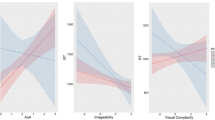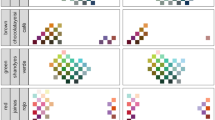Abstract
The present study aimed to investigate how Persian-Turkish bilingual children tend to respond to forced-choice questions pertaining to objects. A total of 42 bilingual 5- and 6-year-old children were asked two-option forced-choice questions about a set of four familiar and four unfamiliar objects. The analysis of participants’ responses showed that older preschoolers are less susceptible to two-option forced-choice questions. That is, 5- and 6-year-old bilingual preschoolers are less likely to show a recency tendency unless they are asked about unfamiliar objects. Overall, the results evidenced that children’s familiarity with objects influenced their responses, whereas children’s language did not have any impact on their responses. The implications of the findings are discussed.
Similar content being viewed by others
Data Availability
The data that support the findings of this study are available from the corresponding author upon request.
References
Ahern, E. C., Stolzenberg, S. N., & Lyon, T. D. (2015). Do prosecutors use interview instructions or build rapport with child witnesses? Behavioral Sciences & the Law, 33(4), 476–492. https://doi.org/10.1002/bsl.2183.
Aldridge, M., & Wood, J. (1998). Interviewing children. A guide for child care and forensic practitioners. Chichester: Wiley.
Andrews, S. J., Lamb, M. E., & Lyon, T. D. (2015). Question types, responsiveness, and self- contradictions when prosecutors and defense attorneys question alleged victims of sexual abuse. Applied Cognitive Psychology, 29, 253–261. https://doi.org/10.1002/acp.3103.
Behzadnia, A., & Mehrani, M. B. (2017). Young children’s yes bias in response to tag questions. Early Child Development and Care. https://doi.org/10.1080/03004430.2016.1278216.
Bialystok, E. (2015). Bilingualism and the development of executive function: The role of attention. Child Development Perspectives, 9(2), 117–121. https://doi.org/10.1111/cdep.12116.
Brady, M. S., Poole, D. A., Warren, A. R., & Jones, H. R. (1999). Young children's responses to yes-no questions: Patterns and problems. Applied Developmental Science, 3, 47–57. https://doi.org/10.1207/s1532480xads0301_6.
Brown, D. A., Lewis, C., Lamb, M. E., & Stephens, E. (2012). The influences of delay and severity of intellectual disability on event memory in children. Journal of Consulting and Clinical Psychology, 80, 829–841. https://doi.org/10.1037/a0029388.
Brown, D. A., Lamb, M. E., Lewis, C., Pipe, M., Orbach, Y., & Wolfman, M. (2013). The NICHD investigative interview protocol: An analogue study. Journal of Experimental Psychology: Applied, 19(4), 367–382. https://doi.org/10.1037/a0035143.
Brubacher, S. P., Powell, M. B., Snow, P. C., Skouteris, H., & Manger, B. (2016). Guidelines for teachers to elicit detailed and accurate narrative accounts from children. Children and Youth Services Review, 63, 83–92. https://doi.org/10.1016/j.childyouth.2016.02.018.
Cameron-Faulkner, T., Lieven, E., & Tomasello, M. (2003). A construction based analysis of child directed speech. Cognitive Science, 27(6), 843–873. https://doi.org/10.1207/s15516709cog2706_2.
Carlson, S. M., & Meltzoff, A. N. (2008). Bilingual experience and executive functioning in young children. Developmental Science, 11(2), 282–298. https://doi.org/10.1111/j.1467-7687.2008.00675.x.
Choi, S. (1991). Children’s answers to yes–no questions: A developmental study in English, French, and Korean. Developmental Psychology, 27, 407–420. https://doi.org/10.1037/0012-1649.27.3.407.
Conroy, R., & Salmon, K. (2006). Talking about parts of a past experience: The impact of discussion style and event structure on memory for discussed and nondiscussed information. Journal of Experimental Child Psychology, 95, 278–297. https://doi.org/10.1016/j.jecp.2006.06.001.
Ferjan Ramirez, N., Ramirez, R. R., Clarke, M., Taulu, S., & Kuhl, P. K. (2017). Speech discrimination in 11-month-old bilingual and monolingual infants: A magnetoencephalography study. Developmental Science, 20(1), 1–16. https://doi.org/10.1111/desc.12427.
Francis, W. S. (1999). Cognitive integration of language and memory in bilinguals: Semantic representation. Psychological Bulletin, 125(2), 193–222. https://doi.org/10.1037/0033-2909.125.2.193.
Fritzley, V. H., & Lee, K. (2003). Do young children always say yes to yes-no questions? A metadevelopmental study of the affirmation bias. Child Development, 74, 1297–1313. https://doi.org/10.1111/1467-8624.00608.
Fritzley, V. H., Lindsay, R. C. L., & Lee, K. (2009). Is it a) primacy bias or B) recency bias? Young children’s response tendencies toward dual-option multiple choice questions. Presented at the biennial meetings of the Society for Research in Child Development, Denver, CO, April.
Fritzley, H. V., Lindsay, R. C. L., & Lee, K. (2013). Young children’s response tendencies towards yes-no questions concerning actions. Child Development, 84, 711–725. https://doi.org/10.1111/cdev.12006.
Hanna, K., Davies, E., Crothers, C., & Henderson, E. (2012). Questioning child witnesses in New Zealand’s criminal justice system: Is cross-examination fair? Psychiatry, Psychology and Law, 19(4), 530–546. https://doi.org/10.1080/13218719.2011.615813.
Home Office (2011). Achieving the best evidence in criminal proceedings: Guidance on interviewing victims and witnesses, and guidance on using special measures. Retrieved from: http://www.cps.gov.uk/publications/docs/best_evidence_in_criminal_proceedings.pdf
Katz, C., & Hershkowitz, I. (2010). The effect of drawing on children’s accounts of sexual abuse. Child Maltreatment, 15, 171–179. https://doi.org/10.1177/1077559509351742
Klemfuss, J. Z., Quas, J. A., & Lyon, T. D. (2014). Attorneys' questions and children's productivity in child sexual abuse criminal trials. Applied Cognitive Psychology, 28(5), 780–788. https://doi.org/10.1002/acp.3048.
La Rooy, D., Brubacher, S. P., Aromäki-Stratos, A., Cyr, M., Hershkowitz, I., Korkman, J., et al. (2015). The NICHD protocol: A review of an internationally-used evidence-based tool for training child forensic interviewers. Journal of Criminological Research, Policy and Practice, 1(2), 76–89. https://doi.org/10.1108/JCRPP-01-2015-0001.
Mehrani, M. B., & Peterson, C. (2015). Recency tendency: Responses to forced-choice questions. Applied Cognitive Psychology, 29(3), 418–424. https://doi.org/10.1002/acp.3119.
Mehrani, M. B., & Peterson, C. (2017). Children’s recency tendency: A cross-linguistic study of Persian, Kurdish and English. First Language, 37(4), 1–19. https://doi.org/10.1177/0142723717694055.
Moriguchi, Y., Okanda, M., & Itakura, S. (2008). Young children’s yes bias: How does it relate to verbal ability, inhibitory control, and theory of mind? First Language, 28, 431–442. https://doi.org/10.1177/0142723708092413.
Okanda, M., & Itakura, S. (2010). Do bilingual children exhibit a yes bias to yes-no questions? Relationship between children’s yes bias and verbal ability. International Journal of Bilingualism, 14(2), 227–235. https://doi.org/10.1177/1367006910363061.
Peterson, C., & Grant, M. (2001). Forced-choice: Are forensic interviewers asking the right questions? Canadian Journal of Behavioural Science/Revue canadienne des sciences du comportement, 33(2), 118. https://doi.org/10.1037/h0087134.
Powell, M. B., Benson, M. S., Sharman, S. j., Guadagno, B., & Steinberg, R. (2013). Errors in the identification of question types in investigative interviews of children. International Journal of Police Science and Management, 15(2), 144–156. https://doi.org/10.1350/ijps.2013.15.2.308.
Powell, M. B., Hughes-Scholes, C. H., Smith, R., & Sharman, S. J. (2014). The relationship between investigative interviewing experience and open-ended question usage. Police Practice and Research, 15(4), 283–292. https://doi.org/10.1080/15614263.2012.704170.
Rocha, E. M., Marche, T. A., & Briere, J. L. (2013). The effect of forced-choice questions on children's suggestibility: A comparison of multiple-choice and yes/no questions. Canadian Journal of Behavioural Science/Revue canadienne des sciences du comportement, 45(1), 1–11. https://doi.org/10.1037/a0028507.
Rudy, L., & Goodman, G. S. (1991). Effects of participation on Children's reports: Implications for Children's testimony. Developmental Psychology, 27(4), 527–538. https://doi.org/10.1037/0012-1649.27.4.527.
Sharman, S. J., & Powell, M. B. (2012). A comparison of adult witnesses’ suggestibility across various types of leading questions. Applied Cognitive Psychology, 26(1), 48–53. https://doi.org/10.1002/acp.1793.
Walker, N. E., Lunning, S. M., & Eilts, J. L. (1996). Do children respond accurately to forced-choice questions? Yes or no. Paper presented at the NATO Advanced Study Institute on Recollections of Trauma: Scientific Research and Clinical Practice, Talmont Saint Hilaire, France.
Wells, C. G. (1981). Learning through interaction: The study of language development. Cambridge: Cambridge University Press.
Wright, R., & Powell, M. B. (2006). Investigative interviewers’ perceptions of their difficulty in adhering to open-ended questions with child witnesses. International Journal of Police Science and Management, 8(4), 316–325. https://doi.org/10.1350/ijps.2006.8.4.316.
Acknowledgements
We would like to thank all children who participated in this study. In addition, we acknowledge the cooperation of the principals and teachers of the child care centers who assisted us in collecting the data.
Funding
This study was not funded by any funding agencies or academic organizations.
Author information
Authors and Affiliations
Corresponding author
Ethics declarations
All procedures performed in this study involving human participants were in accordance with the ethical standards of the institutional and national research committee and with the 1964 Helsinki declaration and its later amendments or comparable ethical standards.
Informed Consent
In addition, informed consent was obtained from all individual participants included in this study.
Conflict of Interest
The authors declare that they have no conflict of interest.
Appendix
Rights and permissions
About this article
Cite this article
Behzadnia, A., Mehrani, M.B. Persian-Turkish Bilingual Children’s Responses to Forced-Choice Questions. Curr Psychol 39, 987–993 (2020). https://doi.org/10.1007/s12144-018-9814-x
Published:
Issue Date:
DOI: https://doi.org/10.1007/s12144-018-9814-x




